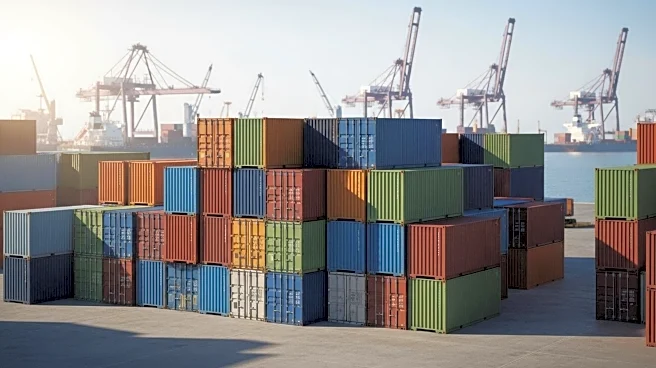What is the story about?
What's Happening?
China's exports to the United States fell by 27% in September compared to the previous year, despite a global export growth reaching a six-month high. Customs data revealed that China's worldwide exports increased by 8.3%, surpassing economists' expectations. This growth contrasts with a 33% drop in exports to the U.S. in August, marking the sixth consecutive month of decline. The ongoing trade tensions between Beijing and Washington, including new tariffs and retaliatory measures, have pressured Chinese exports to the U.S. Consequently, China has expanded its market presence in other regions, with exports to Southeast Asia, Latin America, and Africa showing significant growth. The vice minister of China's customs agency highlighted the challenging external environment and the need for efforts to stabilize trade.
Why It's Important?
The shift in China's export strategy has significant implications for global trade dynamics. As China diversifies its export markets, U.S. manufacturers may face increased competition in regions where China is expanding its presence. The ongoing trade tensions could further strain relations between the world's two largest economies, potentially impacting global supply chains and economic stability. The situation underscores the importance of trade negotiations and the need for a comprehensive agreement to mitigate the adverse effects of tariffs and export controls.
What's Next?
The trade tensions could jeopardize plans for a meeting between President Trump and Chinese President Xi Jinping, suggesting a lack of progress in forging a broad trade agreement. The potential escalation of export controls and tariffs may lead to prolonged impacts on supply chains, affecting businesses and consumers globally. Stakeholders will closely monitor developments in trade negotiations and the potential for new retaliatory measures.
Beyond the Headlines
The trade tensions highlight the complexities of international trade policies and their impact on global economic relations. The situation raises ethical considerations regarding the use of tariffs and export controls as tools for political leverage. Long-term shifts in trade patterns may influence global economic power balances and necessitate new strategies for international cooperation.
















